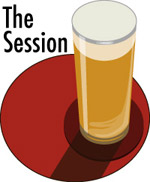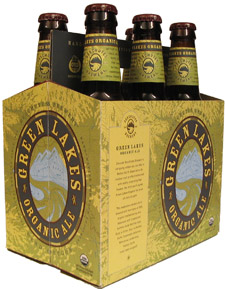 Don’t know how many of you frequent growers’ markets, so a quick description of how buying sweet corn works around here.
Don’t know how many of you frequent growers’ markets, so a quick description of how buying sweet corn works around here.
Quite often vendors will have the top of ears pealed back. This is so you can see how much damage the ear worm has done. When we get home we lop the portion the worm is still living in, soak the corn and cook it (often on the grill).
Does it taste great because it is organic, because it is fresh, maybe for both reasons?
I don’t know for sure. Just like a don’t know the answer to the next question. Should organic beer taste better, or at least somehow different?
A question I ask because the topic for The Session #13 today is organic beer. Host Chris O’Brien has the roundup.
So the beer I am contemplating this with is Green Lakes Organic Ale from Deschutes Brewery. A nice beer, though it wouldn’t make me give up Mirror Pond Pale Ale (to pick another from Deschutes). It gets points for making a fresh impression — logically or not, that’s something I expect from an organic beer.
 Some of that is shortbread sweetness on the palate, and much of it is a solid dose of hops (the brewery reports this beer is 45 IBU, meaning significant bitterness). It’s on the edge, or for some it has probably gone over, of being dishwater harsh. I like the combination of apricot/peach and pine aromas, plus a bit of spiciness that lasts through the finish.
Some of that is shortbread sweetness on the palate, and much of it is a solid dose of hops (the brewery reports this beer is 45 IBU, meaning significant bitterness). It’s on the edge, or for some it has probably gone over, of being dishwater harsh. I like the combination of apricot/peach and pine aromas, plus a bit of spiciness that lasts through the finish.
It’s not clear all the hops are organic — in fact, I think not. There’s a whole ‘nother issue on if beers need to contain organic hops to be called organic, and let’s pass on that today. Deschutes does brag that the beer includes certified Salmon-Safe Sterling hops (perhaps explaining the spicy notes). That’s a good thing. Deschutes also went to the trouble of getting organic certification for the 50 barrel brewhouse which produces Green Lakes. Another good thing.
Back to what organic beer should taste like. For instance, Mateveza Yerba Mate, brewed with a South American energy tea under contract at Butte Creek (which makes its own organic beers) has definite herbal qualities leaving you with the thought This is different.
But beyond the obvious, there are other reasons to think organic ales might actually taste better. No doubt some companies, not just those selling beer, see consumer interest in all things organic as nothing more than a business opportunity. It seems more likely, however, that a brewer who goes to the trouble or a barley farmer who goes to the trouble doesn’t view organic as a gimmick. Effort tends to make things better.
In fact, don’t let brewer-owner Christian Ettinger at Hopworks Urban Brewery in Portland get started on the high quality of organic malt he has available to him without a full glass of beer in hand. You are going to be there for a while.
Speaking of which, I hope somebody found a HUB beer for today’s Session. Check the roundup to find out.
I can’t say whether the hops are all organic, either, but it’s worth noting that to be certified organic by Oregon Tilth, the entire brewery has to go through a six-month vetting. So give the brewery its due there.
Also, Oregon has really gone organic. Many breweries now feature organic beers, some are all-organic, and we have an Organic Beer Festival (June will mark the third anniversary).
I found Green Lakes a disappointment, mainly because the brewery has produced so many exceptional beers. It was a wee bit pedestrian, I thought.
It was a wee bit pedestrian, I thought.
That’s because you are spoiled.
I sort of remember you have written on this topic of organic maybe bringing out the best in brewers. If so we can add the link here.
Ok, here we go.
Salmon-Safe: a marketing angle(?) that represents hop growers (Oregon only?) who provide a “buffer zone” between hop fields and streams to eliminate pesticide and herbicide residue runoff. This is good ( but unneccesary if growing REAL organic hops). Is this just “organic hops” cheating with Imitacloprid? Unlevel playing fields out there.
Dishwater harsh: could that be from roasted aphids or imitacloprid residue or just soap in the system? (joke?)
Yerba Mate: These leaves must be dried, organic or not. Some providers “smoke” dry the leaves while others dehydrate the leaves. There is a HUGE difference in flavor. The “smoke” dried leaves seem like they have so much precipitated residue on them from whatever plant they burn to dry the leaves that the Yerba Mate tastes extremely harsh. The dehydrated leaves have a wonderful natural sweet flavor.
But beyond the obvious, there are other reasons to think organic ales might actually taste better.
If it’s really organic, it will taste different- and better.
If you can’t tell, I’m a Certified Organic Hop and Tomato Grower and I’m biased because I’m spoiled.
And I respect folks with enough passion to go through the organic certification process. Watch the movie “My Father’s Garden” and see what you think.
I am completely out of my depth here, but I suspect that bad things are going to happen to the economy and it makes sense to attempt brewing on a small scale if we who live on remote Pacific islands are going to be bartering on a larger scale, for two reasons….naturally, the first is that people will want a bucket of beer…but the second is purely practical. All of our water is rainwater and it must be held in catchment systems…which can fill up with things you don’t want to drink. So, given a choice between boiling water or using the same wood to brew beer, which is safe to drink, beer wins.
Hops, however, won’t grow in the tropics. Will someone please point me to a book that explains how to make beer or ale with heat but without the traditional hops? Obviously I am a neophyte, but this may well be something I need to learn at an accelerated pace.
Thanks to all,
I am sorry for picking a thread basically at random. I did a search and this popped up.
a hui hou
Tom
I’d consider Heather tips if you can get your hands on them Tom, great for Milds or Scottish